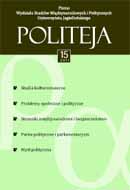‘The End of the Affair’? The United States, Poland, and Continental Drift
‘The End of the Affair’? The United States, Poland, and Continental Drift
Author(s): Christopher ReevesSubject(s): Politics / Political Sciences
Published by: KSIĘGARNIA AKADEMICKA Sp. z o.o.
Summary/Abstract: This article examines the diplomatic relationship between Poland and the United States in the post -Cold War period. It will be argued that during the 1990s successive Polish governments sought to cultivate a close, perhaps ‘special’, relationship with the United States. This was mainly a consequence of the fact that the ‘security culture’ within Poland was acutely sensitive to threats to the country’s territorial integrity. This security culture has been largely moulded by the country’s history, and the fact that, historically, Poland has faced a particularly acute ‘security dilemma’, in that it has been sandwiched between two larger, more powerful neighbours in the shape of Germany and Russia. During the 1990s, Polish policy -makers swiftly reached a consensus that only the United States had the capabilities and the political will to defend Poland from an unpredictable post -communist Russia and a resurgent and unified Germany. Moreover, Poland, at the beginning of the 1990s, found itself beyond the frontier of the ‘security community’ that was constituted by the EU and NATO, and was situated on the fringe of an arc of instability that stretched from the Balkans to the Caucasus. One consequence of the fact that Poland was located beyond the frontier of the Western European security community was that successive Polish governments during the 1990s came to view international relations in a way that was relatively similar to the United States. The Polish government, in particular, believed that military power remained an important ingredient in international affairs, and that a robust approach needed to be adopted when dealing with those states that were determined to destabilize international affairs. Above all else, throughout this period, Polish decision -makers viewed the United States as a force for stability in international affairs, and believed it to be vital that a close relationship was established with it. A consensus also emerged among the Polish political elite that it was in Poland’s interests that it should also become embedded within the ‘western’ security community, and that therefore every effort should be made in order to attain membership of NATO and the EU. Since Poland has entered the ‘security community’ that comes from being a member of these two organisations, Poland’s relationship with the United States has begun to change.
Journal: Politeja - Pismo Wydziału Studiów Międzynarodowych i Politycznych Uniwersytetu Jagiellońskiego
- Issue Year: 8/2011
- Issue No: 15
- Page Range: 211-234
- Page Count: 24
- Language: English

